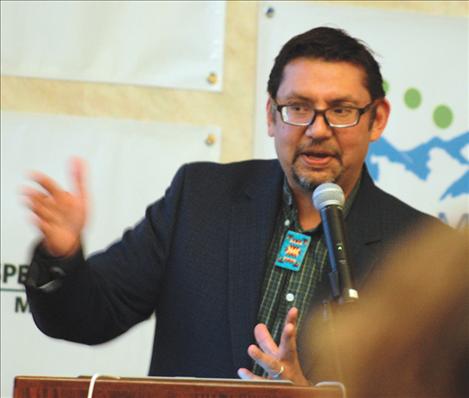Tribes are in ‘age of cooperation’
Hey savvy news reader! Thanks for choosing local.
You are now reading
1 of 3 free articles.
POLSON — Rob McDonald, Confederated Salish and Kootenai Tribal communications director, spoke on the State of the Confederated Salish and Kootenai Tribes at the Sept. 3 Polson Chamber of Commerce luncheon.
“Relations between the tribes and the larger community are the best they’ve ever been,” McDonald said.
The Flathead Reservation is a large reservation, McDonald said, larger than the state of Rhode Island.
“The CSKT tribes are an octopus with many tentacles,” he added, with 1,200 employees, a $45 million annual payroll and approximately 8,000 tribal members.
One of the tentacles is Energy Keepers, Inc. EKI is on track to purchase Kerr Dam in 2015 as planned since arbitration is complete.
“(The purchase) is something our leaders envisioned back in the ‘80s,” McDonald said.
He also mentioned U.S. Secretary of the Interior Sally Jewell and Montana Senator Jon Tester’s recent visit to the reservation to discuss the land buy back program, part of the $3.4 billion Cobell settlement.
“As a tribal people, we were not recognized as U.S. citizens until 1924,” McDonald said.
Before 1924, if someone had an allotment of land, when he or she passed, the land went to the children. The children handed it down to their children. Soon it’s 20 to 30 living people who own the land.
“You can’t sell it. You are a co-owner. You own a share, and you need permission from the other 18 to 20 family members,” McDonald said, explaining the problem and describing it as “an inherited historical nightmare.”
The Cobell settlement, in response to mishandling of leasing or mineral rights income, created a mechanism to buy back the land. McDonald said 331 offers went out to fractioned landowners as of Sept. 5.
“The lands are already in trust,” he said, adding that it’s the solution to a historic problem.
McDonald also touched on the water compact.
“For the third time, the Bureau of Mines said this is solid science,” McDonald said.
The final opportunity for the water compact to be passed is the 2015 Montana legislature. The document will be very similar to what it was before, he said.
Compact supporters are organized, and the CSKT Tribal Council is still in favor of the compact, McDonald noted.
“The bigger problem is the drug problem,” he said.
Prescription drugs are an issue, and there’s a “highway of drugs coming in from the outside (of the reservation).”
The tribes care deeply about this problem, he said, and “threw the kitchen sink at it,” including four grass roots organizations, law enforcement, social services, tribal health, tribal council, volunteers and the community — all saying “This has to stop.”
On the positive side, there are cooperative partnerships between Lake County and Best Beginnings, and networking between all who work in these departments provides a bright note.
Best Beginnings Children’s Partnership draws the tribes, Lake County Public Health, reservation school districts, Providence St. Joseph’s Medical Center, St. Luke Hospital, Salish Kootenai College, CSKT Early Childhood Services and many other entities together in a program that serves children from birth to around age 4. The partnership’s stated purpose is to improve long-term school readiness outcomes for all children and families within Lake County and the Flathead Reservation.
This has “evolved from the age of conflict to the age of cooperation,” McDonald said.
















